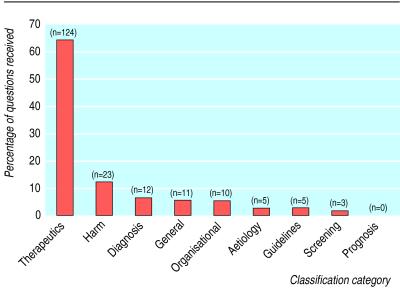General practitioners generate many clinical questions during consultations.1,2 However, when they seek answers to these queries they tend to rely on colleagues and “desk top” references rather than searching the literature themselves.1–3
ATTRACT was created in 1997 to provide rapid, evidence based summaries to clinical queries. All general practitioners in Gwent were invited to send their clinical queries to ATTRACT. For each query an information manager (JB) undertook a rapid search of the literature. The information found was appraised, summarised onto one side of A4 paper, and faxed to the requestor within six hours (see appendix on the BMJ's website for more details on the search, appraisal, and summary process). Examples of the questions received include “Do decongestants help in people with eustachian tube dysfunction?” and “What are the risks of flying while pregnant?” (see BMJ's website for list of most popular questions). We report here an initial evaluation of this service.
Participants, methods, and results
We developed a brief anonymised questionnaire to seek doctors' views on the usefulness of ATTRACT. We sent this to the first 15 general practitioners to use the service and, one year after the initial survey, to the general practitioners who had asked the 35 most recent questions. In addition, we analysed the clinical queries received during that period (1 January 1997 to 31 January 1998).
Forty two (84%) of the 50 general practitioners replied. Of these, 29 (69%) rated the service “very useful” and 13 (31%) rated it “useful.” All the respondents rated the service as “very quick” or “quick,” and all reported that they would use it again. For the 40 doctors who replied to the question about the effect of the supplied information, nine clinicians were already practising in line with the evidence supplied, 24 changed their practice as a result of the information, six did not change practice because of the weakness of the presented evidence, and the remaining one asked a question about prognosis so that change in practice was not relevant.
Of the 193 questions received by ATTRACT in 13 months, 124 (64%) related to therapeutic issues and 23 (12%) related to harm, the next most prevalent category (figure).
Comment
Our study shows that Gwent general practitioners use and value the ATTRACT service. Although our assessment is based on a small number of users, it merits reporting because of the strength of the opinions expressed and our clear impression that fast answers to clinical questions actually change practice. This study is the first to evaluate a fast, evidence based query answering service for doctors in the NHS, and our results support McColl et al's conclusion that doctors want summaries of evidence rather than the skills to produce them themselves.4 Our results also confirm Smith's and Ely et al's reports that most clinical queries relate to therapeutic issues.1,2
The reported changes in practice are encouraging. This is probably because, instead of “pushing” information towards clinicians in the (usually false) hope that they will change practice,5 ATTRACT allows doctors to “pull” information as and when they need it.
Clinicians need rapid access to valid information in an easy to use format if the ideal of an evidence based service is to be achieved. The ATTRACT approach has the advantage of using less expensive staff to conduct the process and using well validated databases and protocols. Policy makers and managers in the NHS must think carefully about how to respond to the information needs of clinicians. Our study suggests that, by removing some of the more laborious stages of evidence based practice, important changes in practice can be realised.
Supplementary Material
Figure.

Classification of 193 queries to ATTRACT from 1 January 1997 to 31 January 1998
Footnotes
Funding: None.
Competing interests: None declared.
A table listing the most popular questions to the ATTRACT project and details of the process for answering them appear on the BMJ website
References
- 1.Smith R. What clinical information do doctors need? BMJ. 1996;313:1062–1068. doi: 10.1136/bmj.313.7064.1062. [DOI] [PMC free article] [PubMed] [Google Scholar]
- 2.Ely JW, Osheroff JA, Ebell MH, Bergus GR, Levy BT, Chambliss ML, et al. Analysis of questions asked by family doctors regarding patient care. BMJ. 1999;319:358–361. doi: 10.1136/bmj.319.7206.358. [DOI] [PMC free article] [PubMed] [Google Scholar]
- 3.Barrie AR, Ward AM. Questioning behaviour in general practice: a pragmatic study. BMJ. 1997;315:1512–1515. doi: 10.1136/bmj.315.7121.1512. [DOI] [PMC free article] [PubMed] [Google Scholar]
- 4.McColl A, Smith H, White P, Field J. General practitioner's perspectives of the route to evidence based medicine: a questionnaire survey. BMJ. 1998;316:361–365. doi: 10.1136/bmj.316.7128.361. [DOI] [PMC free article] [PubMed] [Google Scholar]
- 5.Freemantle N, Harvey EL, Wolf F, Grimshaw JM, Grilli R, Bero LA Cochrane Collaboration, editors. Cochrane Library. Issue 3. Oxford: Update Software; 1997. Printed educational materials: effects on professional practice and health care outcomes. [DOI] [PMC free article] [PubMed] [Google Scholar]
Associated Data
This section collects any data citations, data availability statements, or supplementary materials included in this article.


